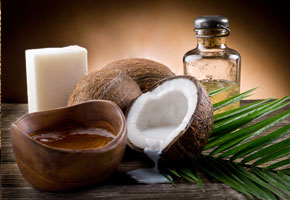
Coconut: the phenomenal fruit (and oil) you may be missing out on
By Linda Bonvie | 2 Comments | Posted 09/17/2014
The idea of escaping to a South Sea Island paradise and relaxing under a coconut palm has long been envisioned as an antidote to the stresses of modern living.
But while we might not be able to just pick up and head for such an alluring spot, there’s one thing about this idyllic vision that is readily available to us – and could make us a lot better able to withstand the pressures and unhealthy influences to which we’re all regularly exposed.
I’m talking about the phenomenal fruits produced by that tree that far too many of us seem to be missing out on.
Why more people don’t take advantage of the awesome attributes coconuts have to offer is a mystery. Whether shredded and used as a topping for various dishes and desserts or pressed into an oil for cooking, you simply can’t find a more beneficial health food than the “white meat” found inside of those shaggy shells.
For one thing, coconut is high in lauric acid, which is anti-bacterial, anti-viral and anti-fungal, so it’s a strong immunity booster.
Coconuts and coconut oil are also a major source of “healthy” saturated fat, which studies have found reduces LDL, or “bad” cholesterol, along with triglyceride levels and increases HDL, or “good” cholesterol. In fact, the Pacific islanders for whom coconut is a staple, are known to have an extremely low rate of heart disease. A study of two groups of Polynesians living on atolls, one of whom gets over 60% of its caloric energy from coconuts, found that “vascular disease is uncommon in both populations and there is no evidence of the high saturated fat intake having a harmful effect in these populations.”
Now, at this point you might be scratching your head and recalling something you might have heard about coconut oil being hazardous to your heart. And, yes, for a number of years, that was the reputation it had. But it turned out to be a “bad rap” caused by the fact that the coconut oil once used in studies was actually a partially hydrogenated variety, which produced artery-clogging transfats now known to be a major culprit in the development of heart disease.
Of course, at the time, nobody was looking at that – instead, they were using the studies to “prove” the faulty hypothesis that the saturated fat in the oil was responsible.
In addition, coconut oil produces medium-chain triglycerides (MCTs) that the digestive process converts into ketone bodies, which, by serving as an alternative energy source for the brain, is believed to help those suffering from Alzheimer’s (a theory backed up by research). And by increasing energy expenditures, those MCTs can also help reduce abdominal fat, as studies with overweight men and women have shown.
But not all coconut oil is created equal, and to get the most benefits, you should look for organic, unrefined extra virgin coconut oil. This is the kind experts are increasingly recommending be used in cooking, since its single-bond saturated fat molecules don’t break down into undesirable compounds under high heat.
And if you like the taste of coconut (and what’s not to like?), you’ll love the added “healthy” flavor it imparts to all your favorite recipes – a little bit like the taste of paradise.


 Contact us
Contact us




























Pingback: “Pick-Me-Up During the Fall” Smoothie | observant EATer